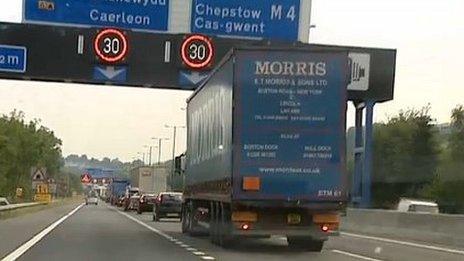M4 relief road: Land ownership influence denied
- Published
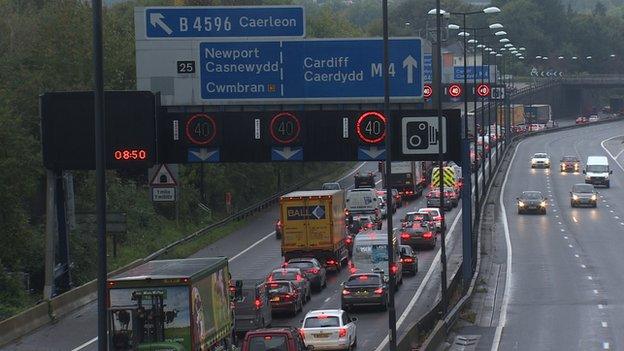
A relief road has been sought to ease congestion on the M4 in Newport
Claims of a flawed process when choosing the new route for the £1bn M4 relief road around Newport have been rejected by the economy minister.
BBC Wales has learned the Welsh government owns more than £12m worth of property along the so-called black route.
Edwina Hart denied it influenced her decision in favour of that option.
Public Accounts Committee chair Darren Millar has asked whether taxpayers have had value for money from land purchase.
The BBC's Week In Week Out programme found that as well as owning £12m worth of property, land and farms along the black route, the Welsh government had spent more than £20m in professional fees to consultants since 1998.
Mrs Hart's denial of any undue influence came in response to questions from AMs in the Senedd on Tuesday.
Liberal Democrat AM Eluned Parrott asked what the value was of a public consultation or the forthcoming public inquiry "if behind the scenes the Welsh government was buying the land to make one specific route possible".
Tory AM Nick Ramsay said there were "major holes in this whole process" and that the public and AMs were "losing confidence".
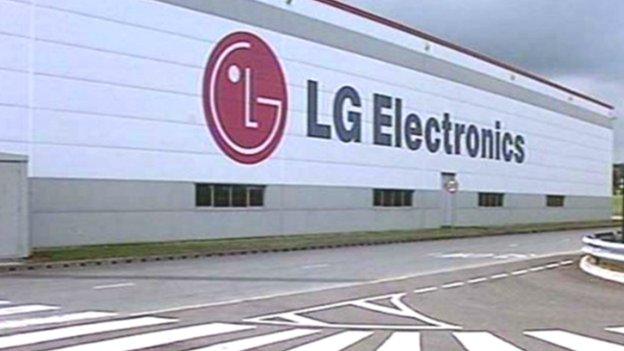
Long gone - the Welsh government bought the former LG Electronics site back in 2005
Mrs Hart insisted she was "undertaking this properly and rigorously".
She added: "Can I make it absolutely clear that Welsh government land ownership has not influenced the selection of a preferred route corridor, and that is the end of the matter.
"You might not accept what I say but I can truthfully tell you that is what I believe absolutely the position to be."
'Pre-emptive strike'
Plans for a relief road to ease congestion on the M4 at the Brynglas tunnels were first announced in 2004 but shelved in 2009 as the cost spiralled to £1bn.
But the project was confirmed as going ahead in July after agreement between the Welsh and UK governments over how to fund it.
The black route was chosen from three options, but a row broke out about another not included in a consultation.
Darren Millar AM says he wants to ensure the Welsh government is not 'going through the motions' with the consultation
Darren Millar, the assembly's Public Accounts Committee chairman asked if tax payers had value for money over the purchase of the land and property.
"It helps a business case from a certain perspective if pieces of land are already in the ownership of the Welsh government," he told the BBC.
"It does seem to me to be almost giving the impression of a pre-emptive strike by the Welsh government in order to lead the conversation around which route to take in a certain direction.
"That concerns me greatly and I am very concerned frankly that it might be damaging tax payers' resources."
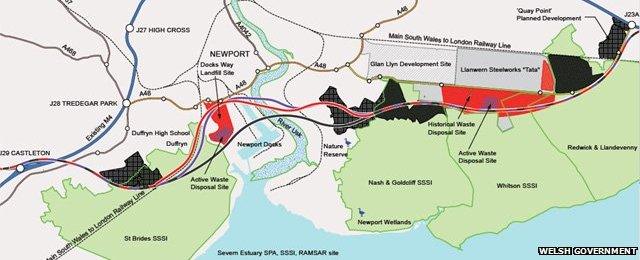
The black route was described as the main draft route, while purple and red routes are 'reasonable alternatives'
A relief road has been sought to ease congestion on the M4 in that area which bottlenecks around the Brynglas tunnels.
Ms Hart announced in July the black route was the preferred route despite it being the most expensive option and that it will cut across five sites of special scientific interest on the Gwent Levels.
Opponents to this option include environmentalists, opposition AMs and two former Labour ministers who called for a blue route to be considered instead.
John and Lauren Lawley have had difficulty selling their house near Magor, Monmouthshire
They say this would upgrade the current road system in and around Newport offering a cheaper and more environmentally sustainable alternative.
A Wales Audit Office spokesperson said the Auditor General is considering the correspondence received.
A final decision about which route the new road will take is not likely to be made until after a public inquiry and following the Welsh assembly elections in 2016.

Black route and 'blight'
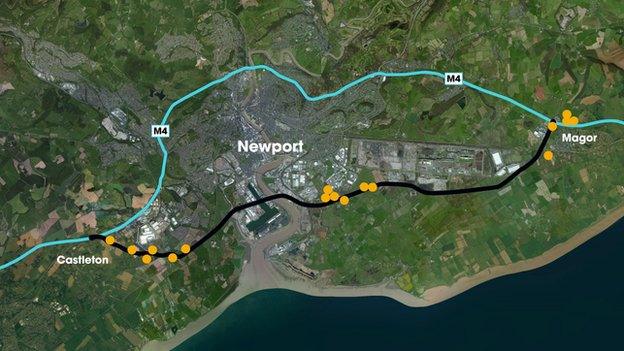
Yellow dots mark land or property owned by the Welsh government
Property and land owned by the Welsh government along the path of the black route was often acquired as a result of blight notices being served by members of the public - at a cost of millions of pounds to the tax payer.
A blight notice is a legal notice served by a homeowner on the government when their property is directly affected by a major development.
The most expensive parcel of land owned by the government along the black route is adjacent to the old LG Electronics site to the west of Newport. The government paid £7m to LG for this land in 2005.
According to the government, the south-western part of this site is likely to be utilised for environmental mitigation measures for the proposed black route.
Week In Week Out asked the government for a full list of land and property it owns, but the government said it did not have this information because they do not keep a database for it.
It also said that land ownership does not influence the selection of a preferred route corridor, and that all properties and land acquired in relation to road schemes are regularly reviewed.
When land is no longer likely to be affected by the proposals, it is declared as surplus to requirements and subsequently sold, according to government officials.

Week In Week Out, Tuesday, 11 November at 22:35 GMT on BBC One Wales
- Published17 July 2014
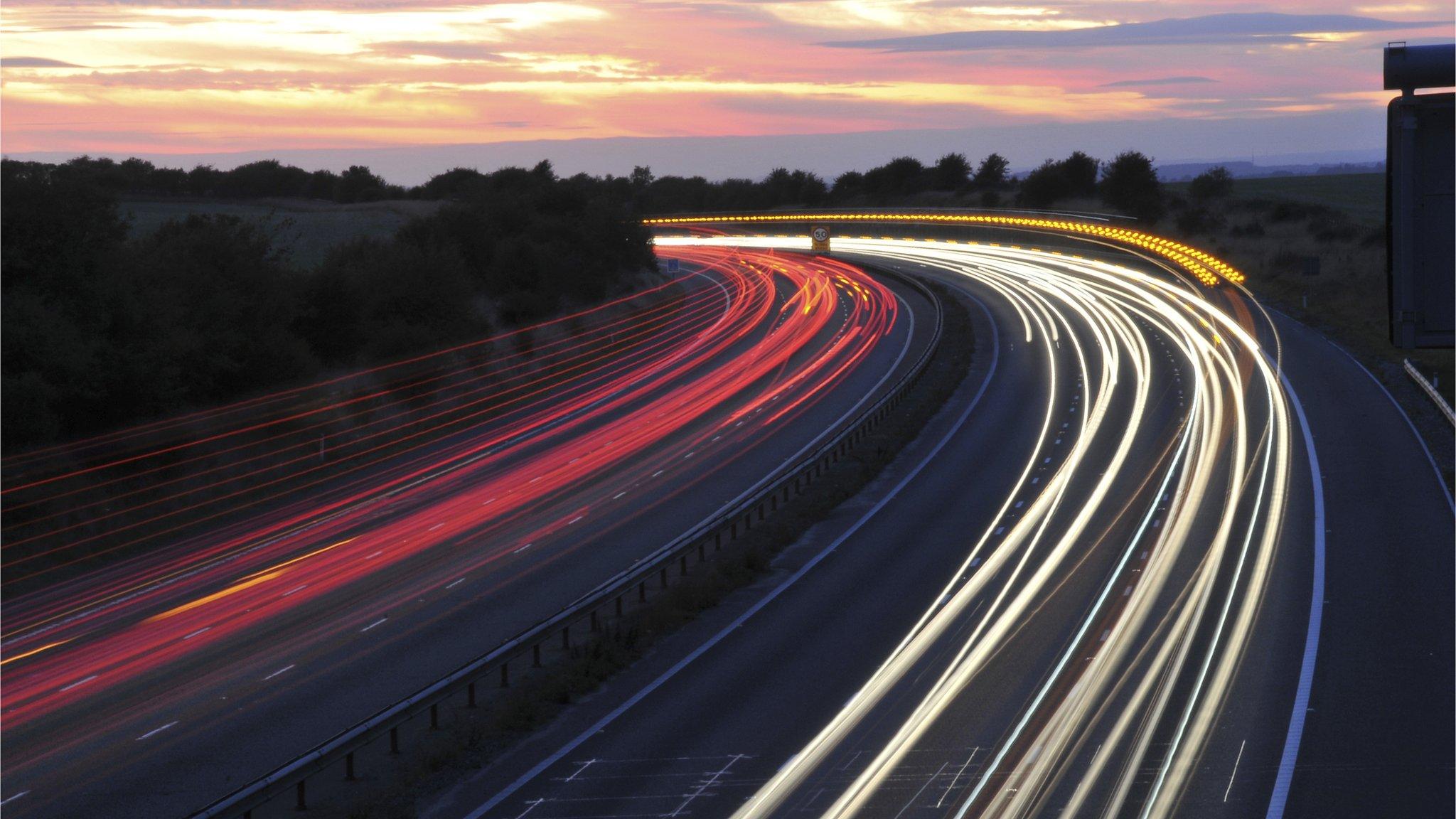
- Published17 July 2014
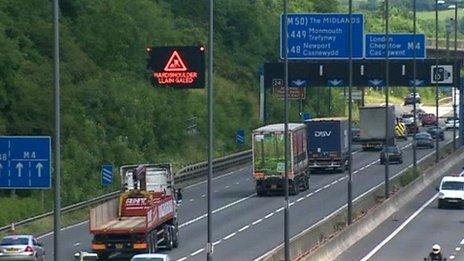
- Published16 July 2014
